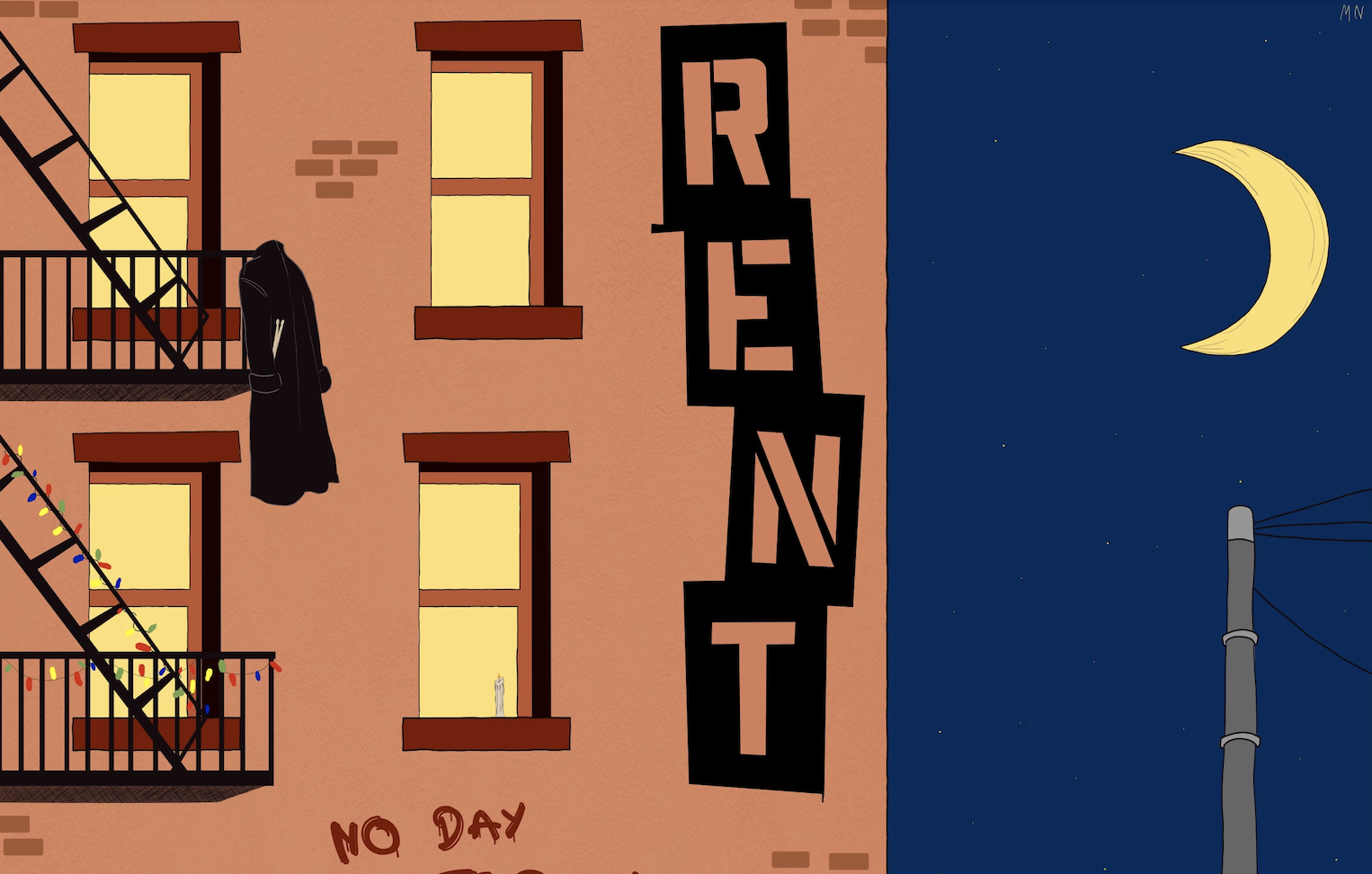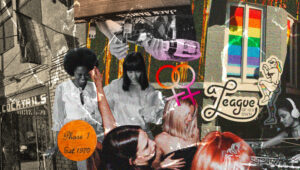Content warning: This article includes references to suicide and self-harm.
When walking into Nomadic Theatre’s humble yet mighty venue, VCT, audience members are immediately drawn into the world of RENT: late-’80s East Village Bohemia. Counterculture posters and relics of a bygone era (a payphone!) are haphazardly strewn across the walls, and of course, the infamous New York City scaffoldings crowd the space. With productions running through Nov. 19, RENT follows the lives of struggling Alphabet City artists just attempting to carry on despite the looming crisis of AIDS and, of course, rent. The diverse cast, from cross-dressers to queer people to landlords, invites even the most off-the-beaten-path audience member to sit down at the RENT table and feel at home.
Nomadic Theatre’s roughly two-and-a-half hour production, broken up over two acts, commences with introductions to Mark (William Hammond, SFS ’23), a filmmaker never without his handheld camera, and despondent Roger (Jack Kealey, COL ’25), a housebound musician struggling to cope with the suicide of his former girlfriend following her AIDS diagnosis. The two are inundated with phone calls in their industrial apartment on Christmas Eve: Mark’s incessant mother calls to console him over the breakup with his now-lesbian ex-girlfriend, Maureen (Caroline Slater, COL ’23), who leaves him for Joanne (Caitlin Frazier, COL ’23), a Harvard-educated lawyer. A close friend of theirs, Tom Collins (Isaiah Hodges, SoH ’26) also calls, only to be assaulted by a group of muggers. And, of course, Benny the landlord (Jordan Ignacio, MSB ’26) calls to remind them that rent is due, causing the two roommates to lose their cool.
Kealey, in his role as Roger, initially appeared stiff and nervous. There was a lack of nuanced facial expression, body language, and emotion—characteristics necessary in depicting the nature of outwardly unaffected yet inwardly suffering Roger. Following the intermission, however, Kealey began to fully embody the subtleties of his character. His emotions came into full force, sending chills down the spine after many passion-fueled scenes.
From the beginning of the production, the actors struggled with audio issues. Director Olivia Martin (COL ’23) prefaced the show with an explanation of the audio situation, and the gracious audience completely understood. Thankfully, one thing truly shined amid these issues: the actors. Not once were the actors fazed by the haphazard audio situation, exhibiting true theater professionalism and a show-must-go-on mentality throughout every production hiccup, big or small.
The vast majority of the costumes donned by the actors felt very true to RENT form. From ’80s grunge denim to long trench coats to tattered blankets—and Mark’s nerdy knit sweaters—the costume designers successfully captured the essence of Bohemian ’80s fashion. Though I’d be remiss not to mention the Lululemon sighting on Mimi (Bella Carlucci, COL ’23), which felt extremely out of place.
The musical continues with introductions to Angel (Eddie Ramirez, MSB ’23), a cross-dressing gay man who falls in love with Tom Collins after the two learn they are both HIV-positive. Meanwhile, Roger meets Mimi, a drug-addicted 19-year-old dancer, and the two exhibit immediate chemistry, yet Roger is reluctant to engage further with her flirtatious behavior. After Mark and Joanne bond over Maureen’s infidelity, we finally meet the infamous—and batshit—Maureen, who begins her protest-turned-audience-assisted-mooing fest (you just had to be there). Slater expertly embodies the unstable yet lovable Maureen. Her performance closely parallels broadway-level RENT productions—and I think she might just walk away with my award for best actor of the night.
The first act winds down with a wholesome gathering of the main cast and ensemble at a café. Benny the landlord, true to landlord fashion, attempts to ruin all the fun. But the Alphabet City misfits only become energized following Benny’s attempted party-pooping. In the midst of all the fun, however, several cast members’ beepers go off, indicating it’s time for AZT. The HIV-positive characters take their meds, and soon after, Maureen and Joanne break up (shocker!). Roger and Mimi both notice the other is HIV-positive, and all that sexual tension finally materializes into a welcomed first kiss to end the act.
Heading into the intermission, and with a break from the chaos, dancing, and drama, I was finally able to process what I’d seen thus far. Given the complexity and length of RENT, a truncated adaptation was expected. But I soon realized this would be a full-length adaptation, and I was pleasantly surprised. In an email interview following the show, Director Martin explains that not only was she bound by a rights agreement, but “a truncated version wouldn’t ever quite be able to grasp the complexities of what we’ve been able to do,” going further to explain that she had “an incredible team of actors and designers who were really game to put in a lot of work”—and boy did the latter show.
At its core, RENT normalizes the ostracized—or maybe ostracizes the normalized. Phraseology aside, one thing stands true: RENT heeds absolutely no time to judgment, highlighting the strengths of diversity, solidarity, and community. No one is unwelcome in the world of RENT—not even landlord Benny—allowing the audience to sit back, relax, and find a character who speaks to them. The HIV/AIDS crisis is at the heart of RENT, too: Every character is directly or indirectly affected by the crisis in some way or another. Instead of a taboo “gay plague,” it is portrayed as a condition that can unify, and it’s also devoid of any stigmatization in the community these outcasts form. Various characters, upon learning the other has HIV, become romantically involved with each other. But that’s not to say the musical romanticizes it in any way either: It was a crisis during the ’80s—a crisis the Reagan Administration was completely negligent to—and the second act ensures the audience truly understands that.
The second act delves into even more chaos of Bohemia. Maureen and Joanne continue to bicker, break up, and makeup—though we just can’t help but to love them anyway. Some characters revisit addictions, and others plan to leave the “center of the universe.” All the former, however, becomes moot once we learn that Angel’s HIV has progressed to AIDS. Her health quickly declines, and we are met with the visceral and uncomfortable truth of the AIDS crisis: death. As the musical comes to an end, we are all left with a reminder to cherish today.
A production of RENT requires attention to all the complexities and detail that make up the show. While one might expect notoriously underfunded college theater programs to cut a few corners to make it all work, Nomadic understood this just wasn’t an option for RENT. In preparation for Mark’s long-awaited mini film, for example, Nomadic recorded their own film of the cast around Georgetown’s campus, projected against a white sheet held in place by those lovely scaffolds (and nothing can get more RENT than that).
RENT encourages its audience to enter into the world of the ’80s East Village and all that comes with it: pain, drugs, crime, and death—but love, laughter, and community, too. We are invited to join a group of Bohemian artists on their journey through life, and we’re invited to cry—and laugh—along with them upon realizing just how unfair a hand they’re dealt. We are asked to destigmatize identity and illness and look at our neighbor as a person, first and foremost. RENT’s only rule is to leave your preconceived notions at the theater door, and I think we can all get behind that—and hopefully that “F*ck Reagan” poster, too.
RENT’s director Olivia Martin is a former leisure editor and executive editor of the Voice. Actor William Hammond is on the Voice’s editorial board. Music director Owen Posnett is a staff writer.





